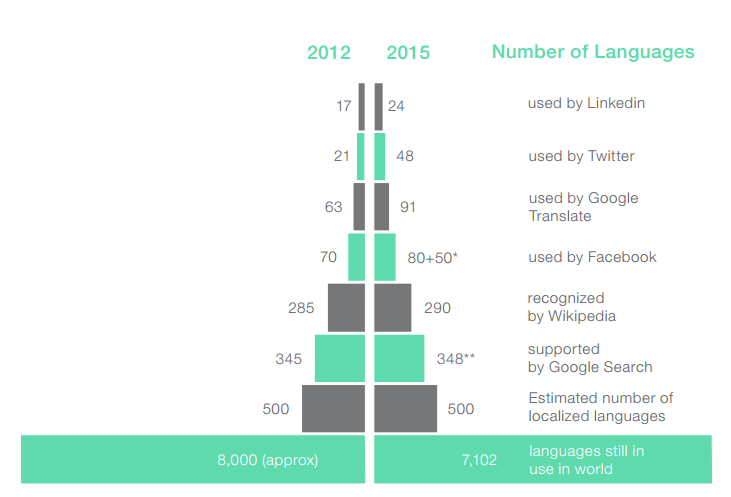Is the Internet killing off the world’s languages?

Stay up to date:
Hyperconnectivity
A large body of evidence shows that affordable and effective broadband connectivity is vital to economic growth,social inclusion, and environmental sustainability. Nevertheless, while internet access has spread around the world and many more people now have access, certain barriers still exist— like language.
Today, only a fraction of world languages– an estimated 5% (by number of languages)– is present on the Internet, according to The State of Broadband 2015, a report by the Broadband Commission. English continues to dominate the web, and around 54.5% of all web content is still in English despite huge growth in users that do not understand that language or who prefer to access content in their native languages. According to analysis of the most popular 10 million websites by W3techs, after English, the most common languages are Russian (5.9%), German (5.7%), Japanese (5.0%), and Spanish (4.7%). Moreover, a significant number of national languages (such as Hindi and Swahili) are used by less than 0.1% of these websites, and most of the world’s languages are not represented at all in their data.
 In 1996, when the Internet was just getting started in the public domain, more than 80% of Internet users were native English speakers. By 2010, that percentage dropped to 27.3%. While the number of English-speaking Internet users has increased since 2000, it has not kept pace with the growth seen in other languages. Twelve times as many people in China use the Internet now as in 1996, and growth is even more dramatic in the Arabic- speaking world, where twenty-five times as many people are online now as in 1996. So the question remains, why does the English language dominate online content in the face of such statistics that show much faster growth in countries where English is not the dominant language?
In 1996, when the Internet was just getting started in the public domain, more than 80% of Internet users were native English speakers. By 2010, that percentage dropped to 27.3%. While the number of English-speaking Internet users has increased since 2000, it has not kept pace with the growth seen in other languages. Twelve times as many people in China use the Internet now as in 1996, and growth is even more dramatic in the Arabic- speaking world, where twenty-five times as many people are online now as in 1996. So the question remains, why does the English language dominate online content in the face of such statistics that show much faster growth in countries where English is not the dominant language?
Beyond the web, over a third of the approximate 7,100 languages spoken today are in danger of disappearing. Ethnologue reports that 1,519 languages are “in trouble” and 915 are considered to be “dying”. They project that the world loses six languages per year.
This article originally appeared on The World Bank’s People, Spaces, Deliberation Blog. Publication does not imply endorsement of views by the World Economic Forum.
To keep up with the Agenda subscribe to our weekly newsletter.
Author: Roxanne Bauer is a consultant to the World Bank’s External and Corporate Relations, Operational Communications department.
Image: People are silhouetted as they pose with mobile devices in front of a screen projected with a Facebook logo. REUTERS/Dado Ruvic.
Don't miss any update on this topic
Create a free account and access your personalized content collection with our latest publications and analyses.
License and Republishing
World Economic Forum articles may be republished in accordance with the Creative Commons Attribution-NonCommercial-NoDerivatives 4.0 International Public License, and in accordance with our Terms of Use.
The views expressed in this article are those of the author alone and not the World Economic Forum.
Related topics:
Forum Stories newsletter
Bringing you weekly curated insights and analysis on the global issues that matter.
More on Economic GrowthSee all
Michelle You
April 10, 2025
Steve Reis and Jill Zucker
April 10, 2025
Nii Simmonds and Obinna Isiadinso
April 9, 2025
Marc Alexander Penzel
April 9, 2025
Christopher Fabian and Aya Miyaguchi
April 8, 2025
Jeremy Jurgens
April 7, 2025



